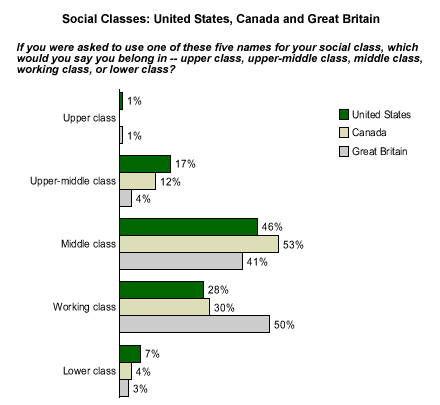One of the benefits of democracy, theoretically, is that it roots out entrenched aristocracies, and promotes a merit-based class system. Thus, social classes are more permeable -- people have the opportunity to move up (or down) the social ladder through their own hard work and ingenuity (or lack thereof). At least that's the theory. Examining the social class composition of the United States, Canada, and Great Britain*, suggests that the labels have somewhat different connotations in the three countries.

Avoiding the Extremes
Few Americans, Canadians, and Britons say they belong to either the upper or lower classes. In America and Great Britain, only 1% say they are members of the upper class. Less than that -- 0.5% -- claim upper class affiliation in Canada.
At least 99% of the populations of these three countries find it inaccurate or impolite to say they belong to the upper class. That leaves a huge proportion available to fill the ranks of the lower class. But this category is nearly as unattractive -- 7% in the United States and 3% in Great Britain say they're lower-class denizens. Again, less than 1% of Canadians say they're lower class.
Majorities in both the United States and Canada claim middle class membership -- 17% of Americans say they are upper-middle class and 46% say they are middle class. In Canada, 12% say they're upper-middle class, and 53% -- the highest percentage in any of the three countries -- says they are middle class. Only in England does less than a majority claim middle class status -- 4% call themselves upper middle class, and 41% say they belong to the middle class.
Heavy Work in England
West of the Atlantic, the term working class typically refers to manual workers and laborers. Twenty-eight percent in the United States, and 30% in Canada, say they belong to the working class -- but exactly half, 50%, of the British describe themselves as such.
Bottom Line
Hierarchical, ancestry-based social class systems are supposedly unbecoming of democratic systems. If everyone is equal, no one can be promoted on the basis of a lucky birth. It's hard to say how successful democracy has been at eliminating social class barriers, although the university legacy system is certainly alive and well. Regardless, the polls show that people in three of the world's most powerful democracies do accept class affiliation, but most reject extreme social class affiliations. Perhaps an overlooked achievement of democracy is not that it eliminates rigid class structures, but that it expands the middle class affiliation. As Judith Martin (aka Miss Manners) said, "There are three social classes in America: upper middle class, middle class, and lower middle class."
*Results in the United States are based on telephone interviews with 1,018 national adults, aged 18 and older, conducted April 7-9 2003. For results based on the total sample of national adults, one can say with 95% confidence that the maximum margin of sampling error is ±3 percentage points.
Results in Canada are based telephone interviews with 1,001 national adults, aged 18 and older, conducted June 11-17, 2003. For results based on the total sample of national adults, one can say with 95% confidence that the maximum margin of sampling error is ±3 percentage points.
Results in Great Britain are based telephone interviews with 1,009 national adults, aged 18 and older, conducted June 4-19, 2003. For results based on the total sample of national adults, one can say with 95% confidence that the maximum margin of sampling error is ±5 percentage points.
Results for the Canada and Great Britain surveys may not equal 100% due to rounding error.
In addition to sampling error, question wording and practical difficulties in conducting surveys can introduce error or bias into the findings of public opinion polls.
